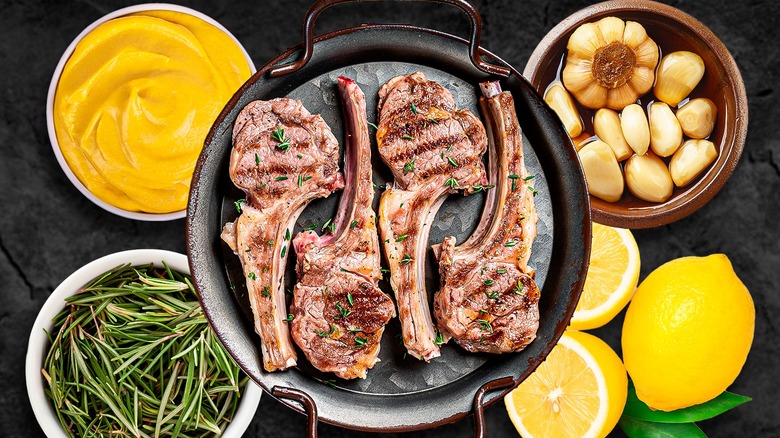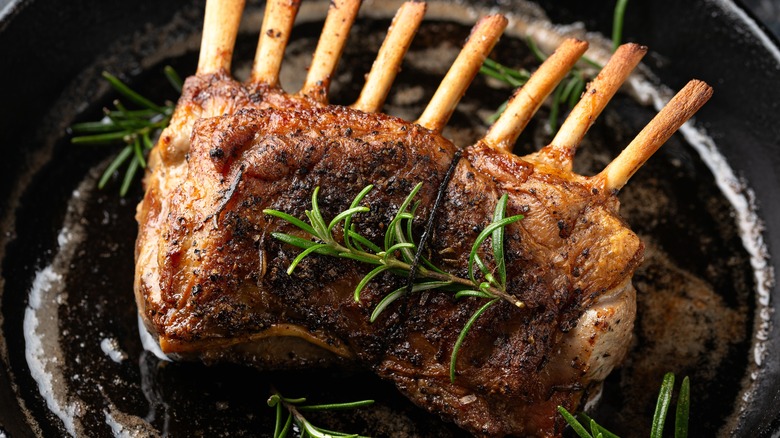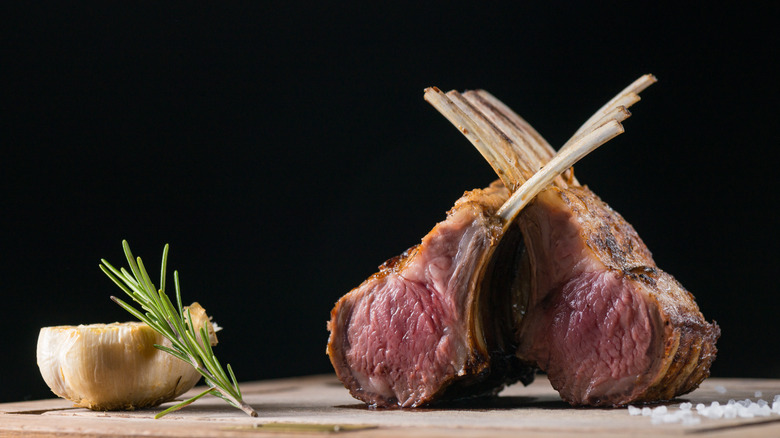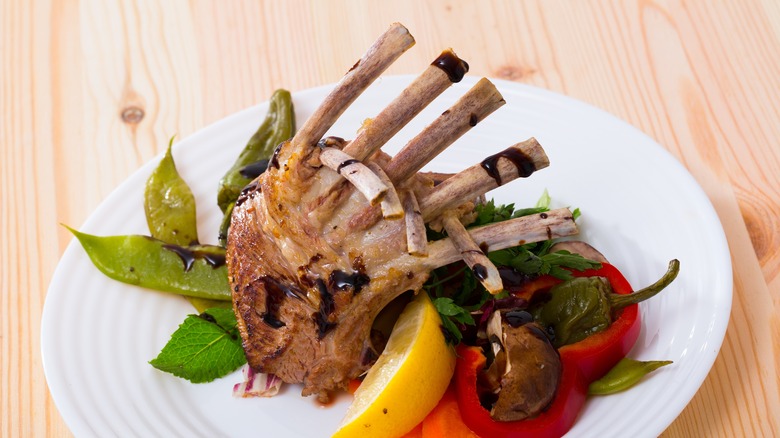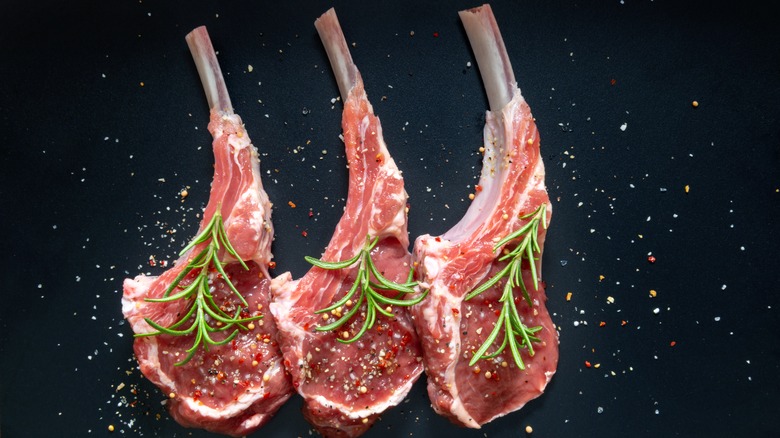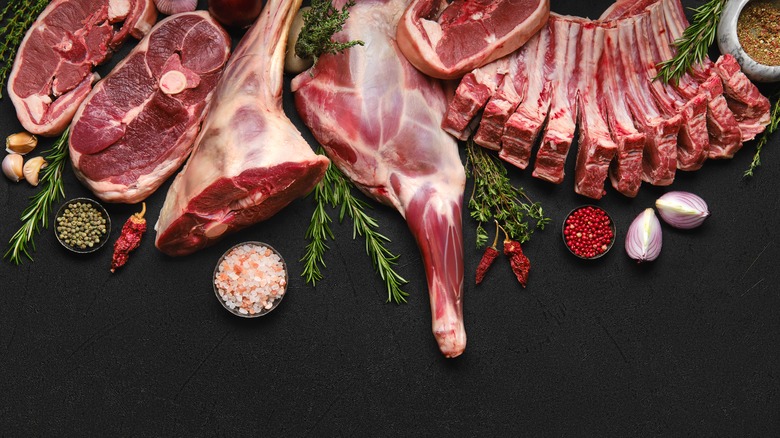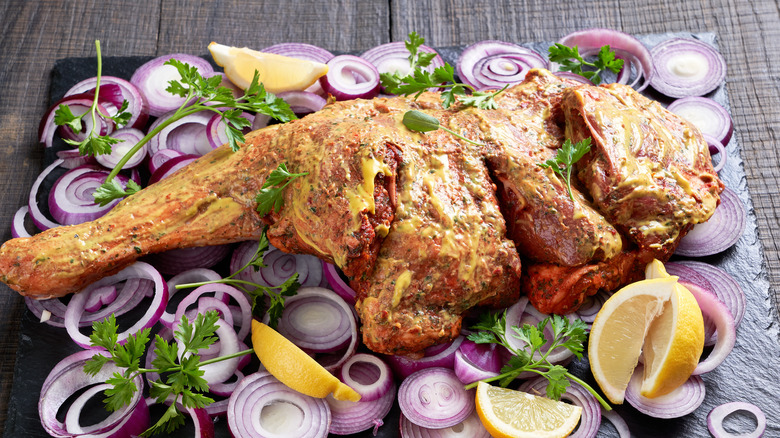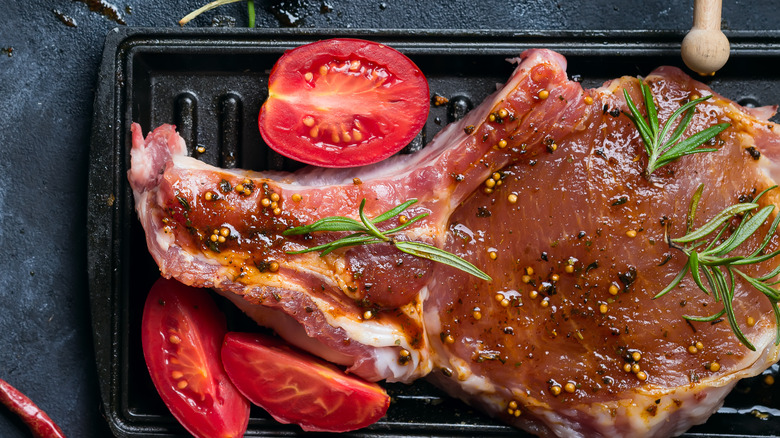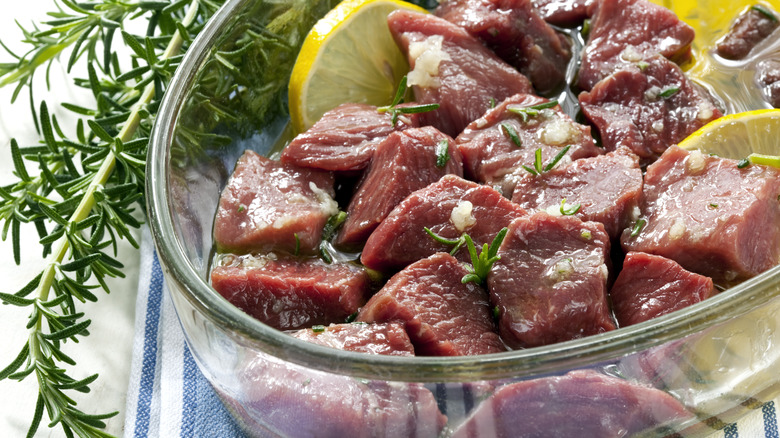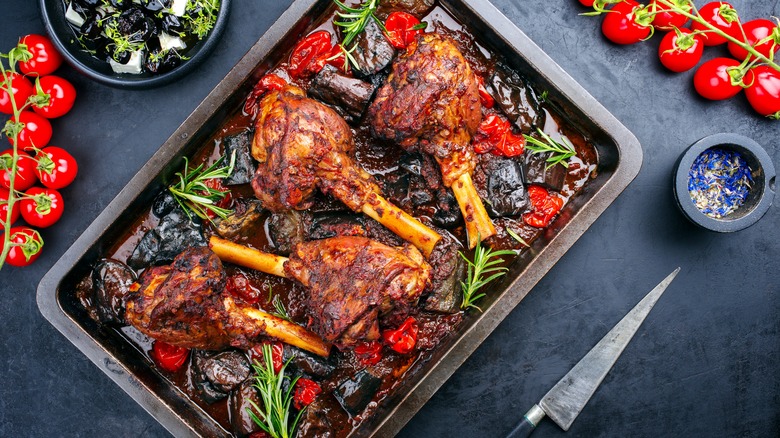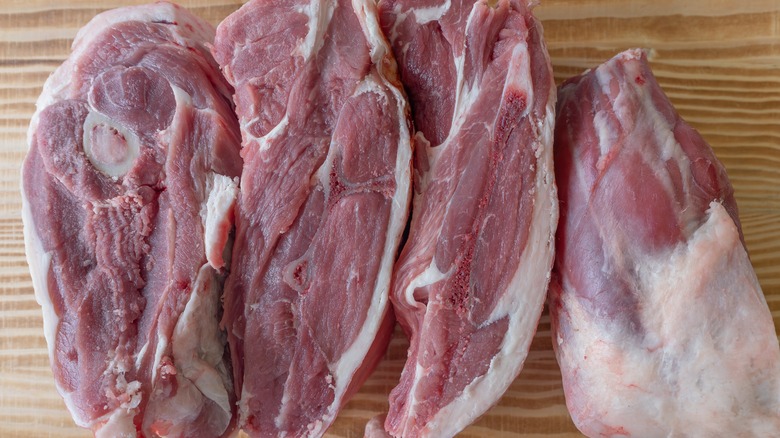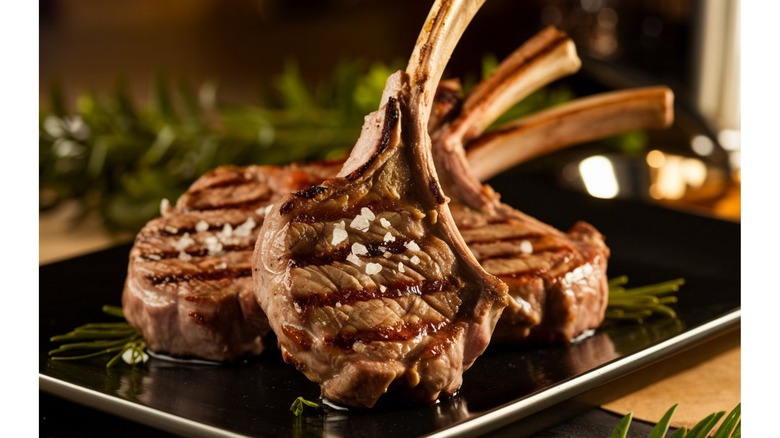A Beginner's Guide To Seasoning Lamb
Cooking lamb can be a daunting task, and for some reason, seems like much more of a challenge to an inexperienced cook than other meats, such as chicken or pork. If you are cooking lamb for the first time, you may be tempted to sprinkle a little salt and pepper over the top and leave it at that, but trust me, this beautiful meat deserves so much better than that.
To help you start your lamb cooking journey as seamlessly as possible, we spoke to three expert chefs who have shared some top tips for seasoning lamb as a beginner. Rich Parente is the chef and owner of Clock Tower Grill in Brewster, NY; Anthony Ramos is a French-trained Chef and graduate of The French Culinary Institute in NYC; and James Massey has 22 years of experience as an executive chef focusing on upscale dining, leading kitchens at Marriott and Hilton hotels, as well as luxury resort Canyon Ranch.
From using garlic and lemon to marinating overnight, these tips will help take your lamb from tasty to mouth-watering. Join us as we explore the best tips for elevating your lamb, and be prepared for some seriously delicious meat.
Use rosemary and thyme
When it comes to herbs and spices, there are many options that will complement the lamb, but there are a few classics that seem like they were made to go along with the rich meat. "I like using rosemary and thyme with lamb since the earthy flavors of these herbs complement the gaminess of lamb well," says Rich Parente.
Anthony Ramos is also a fan of these two woody herbs, with a few tender herbs thrown in, too. "Lamb is my favorite protein and it is a versatile meat that embraces a variety of spices and both dried and fresh herbs. My favorite herbs and flavorings include rosemary, thyme, and parsley."
While adding the herbs directly to the meat will work well, they can also be combined with other ingredients to create a marinade with a great depth of flavor. "A good marinade is rosemary, thyme, red wine and oil blended together, and then once the lamb has soaked in all those flavors, I'll add some salt and pepper before cooking it on the grill," suggests Parente.
It's hard to overdo it with herbs, so be bold and give that lamb as much flavor as you can. James Massey recommends oregano, parsley and mint in addition to the classic combination of rosemary and thyme, so feel free to add any other favorite herbs that you enjoy — the delicious meat will soak up the flavors and be better for it.
Add garlic
Lamb has a deep, rich flavor, which can be livened up with the addition of a clove or two of garlic. The robustness of the meat can cope with garlic's pungent flavor, resulting in a mouthwatering pairing. "Garlic can be crushed, finely chopped or even whole cloves of garlic can be inserted into a cut such as a leg of lamb," says Anthony Ramos. "Garlic adds an earthy, aromatic note to lamb and can be used as a rub with olive oil, fresh or dried herbs and breadcrumbs and panko crumbs to create a delightful crust."
Rich Parente is also a fan of matching up garlic with lamb and likes to couple it with another classic ingredient on our list. "You can't go really wrong pairing garlic and lemon with lamb. You can use just garlic, just lemon or both together, and it would be delicious," he recommends. James Massey agrees, commenting, "Garlic and lemon are great with lamb. You can make this as part of your marinade base and let it sit overnight. You can also do a wet rub with it using lemon zest, some juice, and minced garlic an hour or two before grilling."
Whether you choose to use garlic alone or pair it with the brightness of lemon, your lamb dish will benefit from its distinctive flavor. The smell of the garlic-infused meat cooking will fill your kitchen with the most delicious aroma and get your dinner companions in the mood for the upcoming feast.
Squeeze fresh lemon juice over it
If you are a keen home cook, you will be aware of the difference a squeeze of lemon juice can make to a dish, and lamb is no exception. The savory notes of the meat will be lifted by the citrus juice, cutting through the richness with its bright flavors. "Lemon juice and/or zest adds a bright sparkle of flavor to lamb," says Anthony Ramos. "Combining lemon, herbs and garlic with olive oil or making a compound butter to slather the meat is absolutely delicious."
The lemon juice will impart a different flavor depending on whether you add it before or after cooking, so to create a complex flavor profile, you should consider doing both. "I like grilled lamb steaks, so I'll add some garlic and lemon to a marinade, and then once it's cooked, I'll squeeze a bit of fresh lemon on top of the finished steaks," suggests Rich Parente. "It's a pretty flexible combination of flavors."
For the best possible results, use freshly squeezed lemon juice to give the brightest flavor. Rolling the lemon before you cut it will create more juice, as the inside will begin to soften, meaning each lemon will go further in your cooking.
Timing is everything when adding salt and spices
When we think of seasoning, the first thing that springs to mind is often salt, and this will work well with lamb. The timing, though, is key, as adding it too soon can cause issues with the texture of the meat. "When marinating lamb for a few hours or overnight, adding too much salt can draw out moisture from the meat and make it tougher over time," explains Rich Parente. "That's why I season with salt right before grilling. It's OK to marinate and add seasoning well ahead of cooking time to give all those flavors a chance to make their way into the meat, but don't add salt to the marinade. I recommend salting right before the actual cooking process."
Anthony Ramos points out that the opposite applies to spices in the form of a dry rub. If you want them to impart as much flavor as possible to your lamb, you need to give them time to work their magic. "A dry rub prior to immediate cooking, is let's face it — just seasoning," he says. "If you want those flavors to dig in deeper — let a dry rub sit for at least two hours prior to cooking. I still say overnight is the best amount of time for flavors to permeate."
Think about the cut
It may not have occurred to you that different cuts of lamb would benefit from different seasonings, but it makes sense. Chances are, you don't season your burger the same way as your filet mignon, so tailoring your flavoring to the cut of lamb will pay off on the plate.
Anthony Ramos believes in taking the time to consider the type of lamb you are serving and what seasoning will match it best. Cuts with a short cooking time, such as lamb chops, will be tender and full of flavor with just the classic salt and pepper, whereas a slow-roasted cut will be boosted by some stronger seasoning. "[For] lamb shoulder, consider cumin, coriander, garlic, rosemary, and thyme. A lamb shoulder is great for slow roasting or braising," he suggests. [With] lamb leg, classic seasonings include garlic, rosemary, thyme, Herbs de Provence, lemon, and olive oil. A leg of lamb roasted in the oven with this combination is glorious."
If lamb shanks are your cut of choice, Ramos advises braising them in an aromatic liquor of red wine, garlic, rosemary, thyme, and bay leaves. "The braising liquid will create an unctuous sauce," he explains.
For cooking with ground lamb, the dish you are making will influence how you season. "Ground lamb can be used for burgers, meatballs, tacos, meatloaf, Shepherd's Pie, and so many other things," Ramos points out. "Season as you would for any of these dishes, and you won't be disappointed. Also, consider adding ground venison, beef, or veal to the mix to punch up the flavor profile."
Smear with mustard
Though you might be tempted to play it safe with your lamb seasoning with just a sprinkle of salt and pepper, if you really want to do this beautiful meat justice, consider a bolder option, such as coating it with mustard. The spice from the mustard contrasts perfectly with the deep, meaty flavor of the lamb to create a party for your palate.
To season your lamb with mustard, don't be scared to go all out — smear it across the meat before adding any other seasonings, as they will be able to cling to the coating. Anthony Ramos recommends using Dijon mustard and mixing it with a splash of French white wine before applying to a leg of lamb. Dijon mustard sits beautifully between the mildness of American mustard and the tongue-scorching heat of English or Chinese, meaning it will add a kick to your lamb without overpowering it with spice.
Adding herbs to the mustard-coated lamb means it will form a delicious crust as it cooks, creating a delightful crunch as you take your first bite. No matter what the occasion for your lamb dish, your guests will be impressed by the bold flavor and juicy texture of your mustard-crusted meat and will definitely be asking for the recipe afterward.
Know the difference between a dry rub and a marinade
Preparing your lamb in advance is the key to a flavorful meal, and adding a dry rub or marinade are great ways to achieve this. But choosing between the two can be confusing, especially if you have never used them before. "A dry rub is a blend of herbs and spices that coats the meat, while a marinade is all that plus liquids, which allows those flavors to soak into the meat," explains Rich Parente. "I prefer marinades, as I find submerging lamb into a marinade makes it more flavorful and helps it stay juicier."
Anthony Ramos also explains that while both will alter the flavor of the lamb, only a marinade will make a difference to the texture. "Dry rubs don't alter the meat's texture significantly," he points out. "They help form a flavorful crust as the spices cook on the surface. Dry rubs can be applied shortly before cooking or left on the meat for several hours or overnight. The longer it sits, the more the flavors will permeate the meat's surface. Dry rubs are great for grilling and roasting."
Marinades on the other hand, can start to break down the fibers in the meat, especially if you add lemon juice or another acid. This will make the lamb more tender, as well as infusing it with flavor, resulting in meat that is both juicy and appetizing.
James Massey recommends keeping it simple when it comes to both dry rubs and marinades. "For beginners, I would suggest trying a few base herbs and spices. Try not to overcomplicate the rub or marinade," he suggests.
Marinate overnight if you can
If you are planning your lamb dinner in advance, factor in as much time as possible to marinate the meat. "The longer in advance you season lamb, the more time it has to absorb those flavors," advises Rich Parente. "You can marinate lamb a day or two in advance to really let those seasonings penetrate. It's not ideal to season it 30 minutes before cooking, but if you're in a pinch, it will work just fine."
James Massey also likes to marinate lamb overnight to benefit both the flavor and texture. "Wet rubs are good for an hour or two [but] marinades are great for overnight use," he explains. "Penetrating deeper into the protein and also tenderizing with the acid in the recipe."
When preparing your marinade, give some thought to the flavors that will complement it, as well as what ingredients will give it a helping hand in terms of texture. Bathing overnight in the right mix of liquids can result in a truly wonderful piece of meat the following day.
"Marinades typically contain a combination of acidic ingredients (like vinegar, lemon juice, or wine), oil, herbs, spices, and sometimes sugar or even soy sauce," observes Anthony Ramos. "Marinades infuse the lamb with flavor and moisture. The acids in the marinade help to tenderize the meat and infuse it with flavor. If you are marinating a large cut of lamb, allow it to marinate in the refrigerator overnight. You will thank me tomorrow!"
Take inspiration from other cuisines
The wonderful thing about planning a lamb recipe is that it is a meat that is beloved in many countries, meaning you have a variety of cuisines to take inspiration from. If you want to go beyond the classic seasonings of garlic and rosemary, turn to one of these regions to jazz your meal up a little.
James Massey likes to take inspiration from the Middle East, using za'atar as a seasoning, but with a little more sumac than usual, to give it a tangy kick. " It's great for crusting lamb, and a small drizzle of pomegranate molasses is always nice," he says.
"When I think lamb, I usually think Greek or Mediterranean flavors," admits Rich Parente. "Pairing lamb with tzatziki sauce, a garlicky yogurt sauce with cucumber, is a great combination. Lamb also works great with curry!"
While Anthony Ramos loves to take inspiration for his lamb dishes from many classic cuisines, including Middle Eastern, French and the Mediterranean, he shares that his favorite lamb dish came from a less obvious source. "Some of the best lamb I've ever had was Icelandic lamb in Reykjavik, Iceland," he reveals. "I still think about that dish and crave it often!" If you are making lamb regularly, trying recipes from different cuisines is a great way to mix things up and experiment with bold and unusual flavors. You may just find that lamb kleftiko becomes your new signature dish!
Bring the lamb to room temperature
Now that you have seasoned your lamb to perfection, all that is left is to go ahead and cook it. But wait — in your haste to get your joint of meat into the oven; you may have overlooked one last important rule. "Bring your protein to room temperature to cook," instructs Anthony Ramos. "And once taken out of the heat of cooking — please let your meat rest before diving in to enjoy."
Cooking your lamb — or any other meat — straight from the fridge will have an impact on both the flavor and texture. Room-temperature meat will absorb flavors better, whether from a dry rub or a short marinade before cooking. Obviously, if you are marinating overnight, that will have to be done in the fridge!
Resting the meat after cooking is just as crucial. As it cooks, the juices from the lamb will make their way to the middle of the meat, making the outsides dry. Leaving it to rest away from direct heat for a short while afterward will allow those beautiful juices to distribute themselves throughout the meat where they belong, leaving you with a juicy and delicious dish to serve to your family and friends.
Be fearless and enjoy your lamb!
The last piece of advice the expert chefs have is to enjoy cooking with lamb and don't be afraid to experiment. "Don't be scared of screwing up, and try different flavors," Rich Parente reassures. "Like Bob Ross says, 'We don't make mistakes, we have happy accidents.'"
Anthony Ramos agrees, although he warns against one easy mistake to make — overseasoning. If you are unsure about how much salt or other seasonings are needed, start small, then add a little more. If you add too much, you can't take it back, and your meat will suffer as a result.
"For beginners ... go slow. Read recipes from your favorite chef, make their recipe, and learn to understand the balance you are replicating," James Massey advises. "Then you are off to the races!"
And lastly, if you are hesitant at the thought of cooking lamb for the first time, just go for it. "Don't be afraid of lamb, so many worry about 'gaminess' — good lamb is fresh, luscious and better than most tenderloin beef entrees I've had," Ramos says. "Lamb is luxurious, delicate, flavorful, an absolute treat for any serious eater. If you've tried it once and didn't like it — then maybe it wasn't the best lamb, and perhaps it wasn't prepared right. I urge you to try it again. Done right, it is sublime!"
